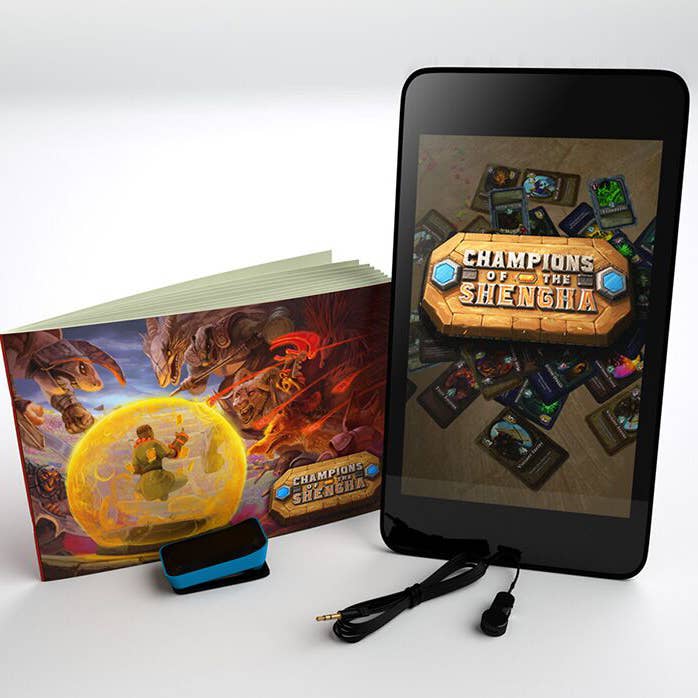The £40 heart-tracking mobile game designed to be sold in shops
BfB Labs founder Simon Fox explains why he shunned Apple Watch and Google Fit to build Champions of the Shengha
It's almost impossible to bring something new to the mobile market. Genres have become oversaturated, mechanics overused, and there are so many monetisation models at work you'd be hard pressed to genuinely claim you're breaking new ground.
But Champions of the Shengha, the debut title by developer BfB Labs, might just offer something entirely different.
The studio specialises in "emotionally responsive gaming", and one need only grasp the premise of Shengha to comprehend what this means. The game is a fantasy card battling game for smart devices, but it requires a special bio-feedback sensor that monitors the player's heart rate.

Champions of the Shengha has been developed in tandem with a proprietary optical sensor that clips to your ear lobe. Thanks to four years of research into biofeedback and sensory technology, this monitors your heart rate over time in order to generate a waveform image that is then shown on your tablet or phone while in-game.
The idea is that as players become calmer and more focused on the card battles, their magic power increases, allowing them to play more powerful cards. If they become stressed or distracted, their magic power lowers, limiting the type of cards they can play.
Speaking to GamesIndustry.biz, BfB Labs founder Simon Fox acknowledged that the game's concept had been inspired in part by the rising popularity of body-tracking tech like Fitbit, but claimed the research his studio has done takes this further, analysing a user's vitals in a way that provides "information about your stress levels, your physiological health and even, at its most complex, your emotional state". It even has a patent pending on the technology.
"We want to be agnostic about hardware but because we need a really high resolution image of your heart rate, proprietary hardware is the best way"
It's for this reason, he explains, that BfB developed its own hardware - or, as the game refers to it, magical transmitter - rather than using established smartwatches and other wrist-straps.
"Ultimately, we want to be agnostic about hardware but, for the time being, because what we're doing needs a really high resolution image of your heart rate, we thought proprietary hardware was going to be best way to give the best possible experience," he says.
"Without getting too technical about it, there are different ways of measuring your heart rate. There's electrical, which is where you strap sensors to your chest, and there's optical, which is what [Apple Watch and Google Fit] are. Wrist-straps [like those] are reflective, they bounce light off your wrist and collect the light, but ours passes through - you clip it onto your ear and the light passes through your ear. It gives us a better image."

All well and good, but here's where building its own magical transmitter makes things more challenging for BfB Labs: the cost of proprietary hardware. While the game itself is free, it cannot operate without the transmitter - and that costs £39.95. Plus shipping.
That's already a £40 barrier to playing a mobile game in an incredibly crowded genre: collectible card games. Couple this with the limited availability of the transmitter - currently only available from BfB's website - and the studio finds itself facing all manner of user acquisition problems that most mobile developers don't encounter.
Nevertheless, Fox remains optimistic: "Our UA cost is predictably pretty high as a result and we don't have that seamless funnel that other games are trying to create, but we see this as our USP rather than an albatross around our neck. It's a creative toy basically."
He is also currently in talks with a number of retailers, with the hopes of selling the transmitter through Amazon at the very least and ultimately on store shelves. This will perhaps give Champions of the Shengha fresh avenues of discoverability unavailable to most mobile titles, but still makes it more difficult for users to simply dip in and try it before committing to the game. How many will take that gamble?
"Sales of the transmitter aren't designed to make us a shedload of profit. We ultimately want to run this as a service"
The title will, of course, feature in-app purchases as well, and while it may seem a tall ask to convince players to shell out for microtransactions after the initial purchase, there are countless (albeit cheaper) mobile titles that prove this is possible. IAP will also help offset the cost of producing the magical transmitter.
"Sales of the transmitter aren't designed to make us a shedload of profit but it's definitely a purchase being made," Fox explains. "We do ultimately want to run this as a service, to keep players happy and motivated for a long period of time."
The transmitter is not just an additional gimmick, it's integral to the gameplay. A calm and focused heart rate increases the player's magic power, enabling them to use the more powerful cards in their deck. Breathing in and out in time with the flickering on-screen waveform, sparks flying in and out to denote breathing direction, also boosts that power.

Unlike most collectible card games available for mobile, battles in Shengha work in real-time. This is not only to provoke a more authentic response from the players, their magic weakening in times of stress, but also to explore how people react to frantic situations and collect data for future use.
"There's a sympathetic relationship between your nervous system, your cardiovascular system and your breathing," says Fox. "Your body is constantly moving between two states: rest and digest, or fight and flight. The extent to which you move into these states give us an insight into your response to stress and a little about your emotional state."
He continues: "In the same way you might expect Gandalf or Harry Potter to focus in order to get into a state of mind that will allow them to cast powerful battle magic, that's exactly what's happening here with our audience."
Champions of the Shengha has been in development for a couple of years, following around four years of research into biofeedback and the technology behind the heart monitor. Following a successful crowdfunding campaign last year, it finally releases for mobile devices this week. But don't expect to see adults clipping this onto their ear during the daily commute - BfB has a firm idea of who this will appeal to.
"Our audience is younger children, between 9 and 13 years old," says Fox. "We've done a lot of product testing with them and they're actually really excited about the hardware proposition and the fantasy of the game. This is your letter to Hogwarts, right? That's the experience we're looking to promote and kids actually quite like it. Whether or not they'll be playing it on the playground remains to be seen, but we've had it in the hands of kids for a long time and seen them using it an awful lot."
He continues: "We've seen kids play 20 or 30 hours within a week, so we think we've got something pretty interesting on our hands."
